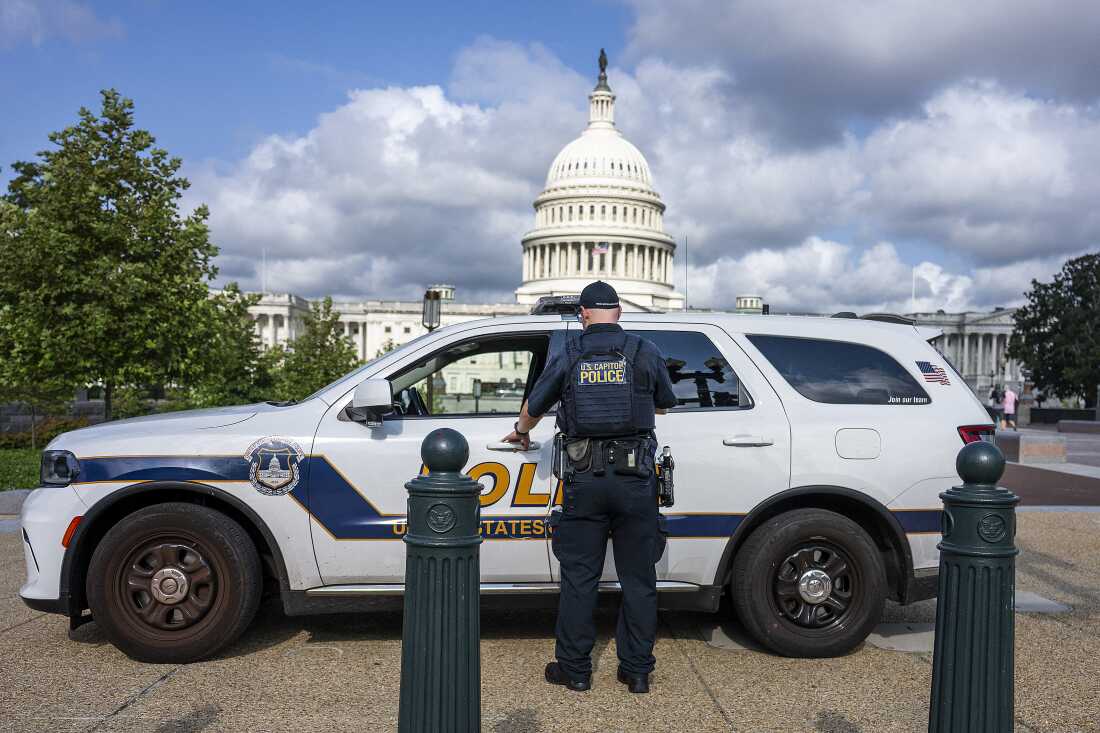
Capitol Police are among the law enforcement agencies tapped by President Donald Trump on August 7 to increase federal law enforcement presence in Washington DC.
JIM WATSON/AFP via Getty Images
hide caption
toggle caption
JIM WATSON/AFP via Getty Images
President Donald Trump is directing federal law enforcement agencies to increase the police presence in Washington, D.C., after a former staffer in the Trump administration was injured Sunday in an attempted carjacking.
The surge in federal policing in the city began just after midnight on Friday morning and is expected to last seven days, with the option to extend enforcement “as needed”, according to a White House official who was granted anonymity to explain the details of the plan. Trump has criticized Washington, D.C., for years, including repeated calls for the federal government to take control of the city.
White House press secretary Karoline Leavitt said in a statement the move is intended to protect the city from violent crime.
“President Trump has directed an increased presence of federal law enforcement to protect innocent citizens,” Leavitt wrote. “There will be no safe harbor for violent criminals in D.C. President Trump is committed to making our Nation’s capital safer for its residents, lawmakers, and visitors from all around the world.”
According to the White House official who spoke anonymously, the policing initiative will be led by the U.S. Park Police, with cooperation from more than a dozen other federal law enforcement agencies, including the U.S. Capitol Police, the Drug Enforcement Administration, the Federal Bureau of Investigation, the Bureau of Alcohol, Tobacco, Firearms, and Explosives, and the U.S. Marshals Service, among others.
However, residents and local officials interviewed Friday by NPR said they have not yet seen a notable increase in police presence. The D.C. National Guard also told NPR in a statement that it had not been activated.
Trump took to social media earlier this week saying crime in the district is “out of control” and repeated his threats to exert federal control of local government.
“If D.C. doesn’t get its act together, and quickly, we will have no choice but to take Federal control of the City, and run this City how it should be run, and put criminals on notice that they’re not going to get away with it anymore. Perhaps it should have been done a long time ago, then this incredible young man, and so many others, would not have had to go through the horrors of Violent Crime. If this continues, I am going to exert my powers, and FEDERALIZE this City,” Trump wrote.
Like much of the country, D.C. saw a surge in crime following the COVID-19 pandemic. The district specifically saw an uptick in violent crime through 2023, making the city one of the deadliest in the country.
However, Washington, D.C., has seen a decline in violent crime since then. In 2024, local lawmakers there passed a far-reaching bill aimed at improving public safety. Violent crime in the city hit a 30-year low last year, according to the Justice Department.
That decline is in line with a nationwide trend of significant decreases in violent crime.
In Washington, motor vehicle theft in the district is at the same level it was at this time last year, according to preliminary data released this week by the Metropolitan Police Department (MPD), but from 2023 to 2024, car thefts fell by 25%.
Homicides in the district are down by more than 10% compared to last year, sex abuse is down by nearly 50% and robbery by almost 30%, according to the city’s data.
The nation’s capital has occupied a unique position in terms of its relationship to the federal government, long before Trump set his sights on addressing crime there. The district’s national guard, for instance, is under federal control, not local. And the district is home to many federal police agencies which answer directly to the federal government.
Its local police force, the MPD, reports to the mayor and city council, but it can be taken over by the federal government for 48 hours if the president deems there to be “special conditions of an emergency nature.” After those two days, the president must notify Congress in order to maintain control of the police for a longer period of time.
Rachel Treisman, Marisa Peñaloza and Luke Garrett contributed to this report.
Source link


